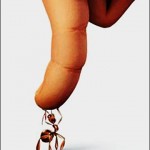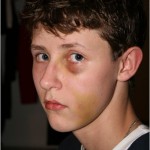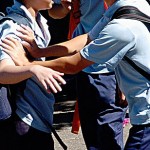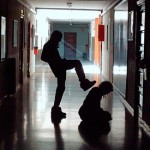Reviewed by: Michelle New, PhD
 It can be shocking and upsetting to learn that your child has gotten in trouble for picking on others or been labeled a bully.
It can be shocking and upsetting to learn that your child has gotten in trouble for picking on others or been labeled a bully.
As difficult as it may be to process this news, it’s important to deal with it right away. Whether the bullying is physical or verbal, if it’s not stopped it can lead to more aggressive antisocial behavior and interfere with your child’s success in school and ability to form and sustain friendships.
Understanding Bullying Behavior
Kids bully for many reasons. Some bully because they feel insecure. Picking on someone who seems emotionally or physically weaker provides a feeling of being more important, popular, or in control. In other cases,kids bully because they simply don’t know that it’s unacceptable to pick on kids who are different because of size, looks, race, or religion.
In some cases bullying is a part of an ongoing pattern of defiant or aggressive behavior. These kids are likely to need help learning to manage anger and hurt, frustration, or other strong emotions. They may not have the skills they need to cooperate with others. Professional counseling can often help them learn to deal with their feelings, curb their bullying, and improve their social skills.
Some kids who bully at school and in settings with their peers are copying behavior that they see at home. Kids who are exposed to aggressive and unkind interactions in the family often learn to treat others the same way. And kids who are on the receiving end of taunting learn that bullying can translate into control over children they perceive as weak.
Helping Kids Stop Bullying
Let your child know that bullying is unacceptable and that there will be serious consequences at home, school, and in the community if it continues.
Try to understand the reasons behind your child’s behavior. In some cases, kids bully because they have trouble managing strong emotions like anger, frustration, or insecurity. In other cases, kids haven’t learned cooperative ways to work out conflicts and understand differences.
Be sure to:
- Take bullying seriously. Make sure your kids understand that you will not tolerate bullying at home or anywhere else. Establish rules about bullying and stick to them. If you punish your child by taking away privileges, be sure it’s meaningful. For example, if your child bullies other kids via email, text messages, or a social networking site, dock phone or computer privileges for a period of time. If your child acts aggressively at home, with siblings or others, put a stop to it. Teach more appropriate (and nonviolent) ways to react, like walking away.
- Teach kids to treat others with respect and kindness. Teach your child that it is wrong to ridicule differences (i.e., race, religion, appearance, special needs, gender, economic status) and try to instill a sense of empathy for those who are different. Consider getting involved together in a community group where your child can interact with kids who are different.
- Learn about your child’s social life. Look for insight into the factors that may be influencing your child’s behavior in the school environment (or wherever the bullying is occurring). Talk with parents of your child’s friends and peers, teachers, guidance counselors, and the school principal. Do other kids bully? What about your child’s friends? What kinds of pressures do the kids face at school? Talk to your kids about those relationships and about the pressures to fit in. Get them involved in activities outside of school so that they meet and develop friendships with other kids.
- Encourage good behavior. Positive reinforcement can be more powerful than negative discipline. Catch your kids being good — and when they handle situations in ways that are constructive or positive, take notice and praise them for it.
- Set a good example. Think carefully about how you talk around your kids and how you handle conflict and problems. If you behave aggressively — toward or in front of your kids — chances are they’ll follow your example. Instead, point out positives in others, rather than negatives. And when conflicts arise in your own life, be open about the frustrations you have and how you cope with your feelings.
Starting at Home
When looking for the influences on your child’s behavior, look first at what’s happening at home. Kids who live with yelling, name-calling, putdowns, harsh criticism, or physical anger from a sibling or parent/caregiver may act that out in other settings.
It’s natural — and common — for kids to fight with their siblings at home. And unless there’s a risk of physical violence it’s wise not to get involved. But monitor the name-calling and any physical altercations and be sure to talk to each child regularly about what’s acceptable and what’s not.
It’s important to keep your own behavior in check too. Watch how you talk to your kids, and how you react to your own strong emotions when they’re around. There will be situations that warrant discipline and constructive criticism. But take care not to let that slip into name-calling and accusations. If you’re not pleased with your child’s behavior, stress that it’s the behavior that you’d like your child to change, and you have confidence that he or she can do it.
If your family is going through a stressful life event that you feel may have contributed to your child’s behavior, reach out for help from the resources at school and in your community. Guidance counselors, pastors, therapists, and your doctor can help.
Getting Help
To help a child stop bullying, talk with teachers, guidance counselors, and other school officials who can help you identify situations that lead to bullying and provide assistance.
Your doctor also might be able to help. If your child has a history of arguing, defiance, and trouble controlling anger, consider an evaluation with a therapist or behavioral health professional.
As difficult and frustrating as it can be to help kids stop bullying, remember that bad behavior won’t just stop on its own. Think about the success and happiness you want your kids to find in school, work, and relationships throughout life, and know that curbing bullying now is progress toward those goals.
















